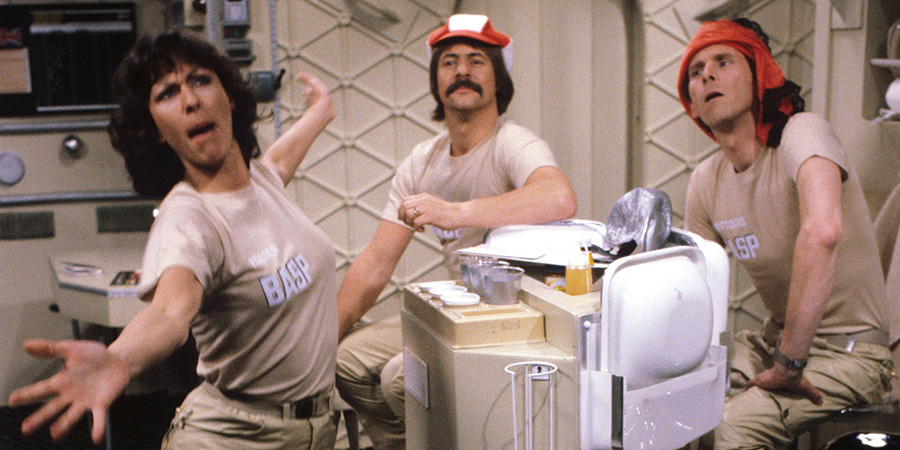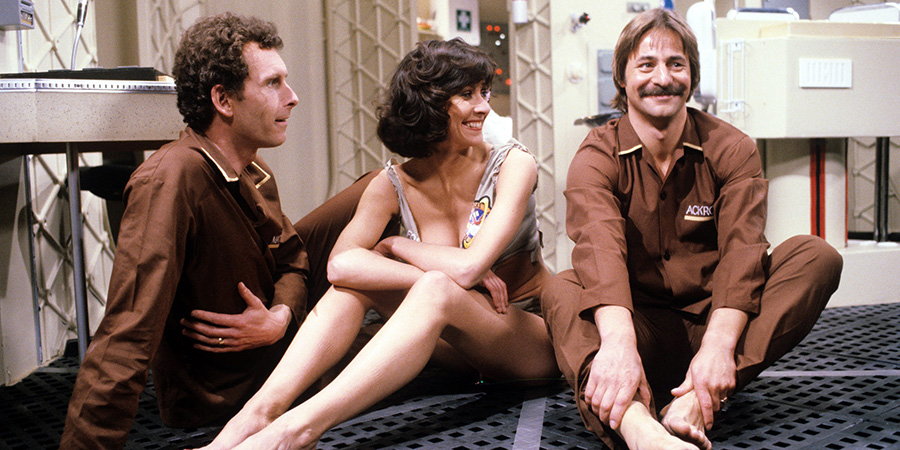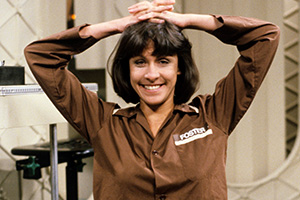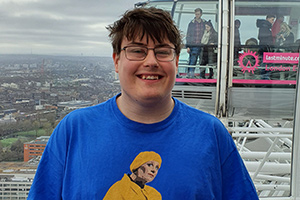
Astronauts: Discover the unknown

Ask the average viewer to name a British comedy set in space and the most likely answer you'll get is Red Dwarf. But Rob Grant and Doug Naylor's series was certainly not the first sitcom to explore the outer realms.
Come Back Mrs. Noah is not only one of the first sitcoms to be set in space, it is also notorious for being one of the most critically derided comedies ever made. Scripted by Jeremy Lloyd and David Croft, the 1977 series was written around the talents of Mollie Sugden, then a huge star from their ongoing, internationally successful Are You Being Served?. Also in the cast was Ian Lavender, stalwart of Jimmy Perry and Croft's Dad's Army, and Croft and Lloyd's future 'Allo 'Allo! lead, Gorden Kaye. Rushed into production to capitalise on the success of Star Wars, the speed showed in both the quality of the scripts, and sets that made contemporary Doctor Who look like a major Hollywood blockbuster.
It didn't help that just one year later Douglas Adams rewrote the rulebook with the original radio incarnation of The Hitchhiker's Guide To The Galaxy. It was 1981 when he adapted the series for television, and a separate space-set sitcom premiered on ITV the very same year: with such an enviable comedic pedigree behind the camera, it is perhaps surprising that Astronauts fell into such obscurity.
The brainchild of Goodies Graeme Garden and Bill Oddie, its premise was not dissimilar to that of Red Dwarf, which would debut on the BBC seven years later: three astronauts are sent on a mission to occupy a space station for six months, in an attempt to break the space endurance record.
Red Dwarf was once described as "Porridge in space", however this description actually applies more so to Astronauts as it was produced by WitzEnd, the company partially owned by Porridge writers Dick Clement and Ian La Frenais, and the pair also served as script editors for the series. Their influence is clear to see, as so much of the comedy revolves around the claustrophobic tensions kept on the boil between its three characters, often ribbing each other in a manner reminiscent of Fletcher and Godber.

Christopher Godwin plays de facto leader Commander Malcolm Mattocks, whose ego fuels much of the conflict. As is the rule in sitcom, if you have an authority figure you need a polar opposite to puncture their delusions of grandeur, and so it is that Barrie Rutter (who previously worked with Clement and La Frenais on the Porridge feature film) plays rough and ready Technical Officer David Ackroyd. Completing the trio is Carmen Du Sautoy as voice of reason Dr. Gentian Foster.
They are helped, and more than not hindered, by ex-astronaut Beadle, played by Bruce Boa, who controls events back at HQ on Earth. Boa is perhaps best known for playing brash American guest Mr Hamilton, he with the hunger for Waldorf Salad, in the Fawlty Towers episode of the same name. Douglas Argent, producer of Fawlty Towers, took on the same role on Astronauts.
For a series set in space and all the associated possibilities that could have been explored, Garden and Oddie's ambition is perhaps strangely small, with the show effectively a flat-share sitcom rather than exploiting the fantastical elements of the setting and exploring sci-fi routes. Another interesting, and in hindsight perhaps mistaken, choice was to film Astronauts in front of a studio audience. Given the relative lack of action enforced by the setting's confines, audience laughter is regularly notable by its absence through fairly long stretches of dialogue. Oddie put it best when he said that due to this set up there was no opportunity to "bring in the funny plumber when things got dull". Garden and Oddie, along with third Goodie Tim Brooke-Taylor, previously flirted with the traditional sitcom format within the context of The Goodies universe in episodes such as The End and Earthanasia, which are often rated amongst its finest episodes.

The broad characterisations of the leads are quite obviously drawn from The Goodies: conflict between the upper class leader, working class second in command and a third trying to keep the peace. A dog that accompanies them on board, Bimbo, also previously appeared in The Goodies. It is perhaps surprising Garden and Oddie didn't write Astronauts as a vehicle for themselves.
Perhaps the creation of the series was an attempt to flex their traditional-comedy-writing muscles after producing so many scripts full of The Goodies' trademark silliness and anarchy. They already had considerable credits in more traditional comic styles, having written dozens of episodes of LWT's Doctor In The House series; itself in stark contrast to their contributions to the ground-breaking satire boom alongside David Frost and The Pythons. It could also have been because Oddie and Garden were concurrently writing and filming the last series of The Goodies. Ironically, The Goodies moved to LWT for that final series because the BBC planned to divert the not inconsiderable sum spent on their show to produce the aforementioned television version of The Hitchhiker's Guide To The Galaxy.
Either way, and despite the input of Clement and La Frenais, wringing plots out of a scenario that found the characters quite literally trapped with nowhere to go proved to be a challenge and the show does meander at times. The main subplot of the third episode, for example, sees Mattocks doing the dusting. That said, the series begins to come into its own in the penultimate episode, which sees the characters get drunk on illicitly made rum. Much like the A Night In episode of Porridge, this is where the characters really get a chance to develop.

The second series builds on the set up of the first, and by the time of the fourth episode, We Are Not Alone, Garden and Oddie imbue the script with genuine pathos. The performances of Godwin, Rutter and Du Sautoy have really gelled by this point, and there is a hint of greater strengths the series could have shown more consistently with a few changes to its format.
Oddie and Garden did at least get to write a final episode of Astronauts that actually rounds things off properly, in a plot that sees the Astronauts finally make their way home but get cold feet at the last minute. Whether this was written to keep things open for a third series is hard to say, though by this point (1983) they were busy with other work, such as reuniting with Brooke-Taylor to provide the voices for the cult children's animated series Bananaman.
Despite its relative lack of critical success, an American adaptation of Astronauts was fast-tracked into production. One might have thought that a US television budget combined with their heritage of high concept science fiction would have made for a hit series. All the right ingredients were there, not least writer Rod Parker, who wrote on the far more successful Till Death Us Do Part remake All In The Family and, later, produced and wrote on the US remake of John Sullivan's Dear John..... It saw Nathan Cook, Bruce Davison, Brianne Leary and McLean Stevenson in the Mattocks, Ackroyd, Foster and Beadle roles, respectively. But, as the ill-fated remake of Red Dwarf would show a few years later, simply transplanting the premise to feature American characters isn't enough. The pilot failed to garner any interest and a series never materialised.

Rutter went on to make a greater name for himself in theatre, while Godwin appeared as a main character in Marks & Gran's Holding The Fort and continues to work as a character actor to this day. Du Sautoy did likewise, appearing in the likes of Absolutely Fabulous and The Worst Week Of My Life. Almost immediately after Astronauts, Oddie created and co-wrote a children's sitcom, From The Top, with Laura Beaumont for ITV, in which he also starred; while Garden consolidated his status as a comedy legend through the continuing success of legendary radio panel game I'm Sorry I Haven't A Clue.
By happenstance, 1981 was the year Grant & Naylor got their first commission onto the radio with Cliché, which developed into Son Of Cliché and then, finally, Red Dwarf. Astronauts may therefore be little more than a curio in the wider comedy careers of Garden and Oddie, but it is nevertheless an interesting experiment, and is, in hindsight, an important stepping stone in the development of science fiction comedy on television.
Where to start?

Series 2, Episode 4 - We Are Not Alone
As the show hits its stride in the second series, the plot sees Ackroyd furious that emergency repairs are now the norm and he is forced to do them. During one of the blackouts Foster sees a bright object outside her lab window.
This episode really shows the potential of the series and teases further possibilities for an hour-long comedy drama, ending on a rather more poignant note than is usual for a sitcom.
Help us publish more great content by becoming a BCG Supporter. You'll be backing our mission to champion, celebrate and promote British comedy in all its forms: past, present and future.
We understand times are tough, but if you believe in the power of laughter we'd be honoured to have you join us. Advertising doesn't cover our costs, so every single donation matters and is put to good use. Thank you.
Love comedy? Find out moreAstronauts - The Complete Series

Two men, one woman and a dog are cooped up together in darkest space. Occupying a two-room 'sky-lab' on Britain's first manned space mission, they are under constant surveillance as they orbit the Earth - even on their visits to the lavatory. Tensions simmer, resentment builds and relationships become strained... and it's not long before they're ganging up on their earthbound American contact at Mission Control.
Written by Graeme Garden and Bill Oddie, this comedy was inspired by and based upon actual conflicts documented by the astronauts of the NASA Skylab programme. Christopher Godwin is Mission Commander Malcolm Mattocks, Barrie Rutter is his truculent partner David Ackroyd, and Carmen du Sautoy is no-nonsense Science Officer Gentian Foster; Bruce Boa stars as their much-abused mission controller, Beadle.
Astronauts was produced by Tony Charles and Douglas Argent (whose combined credits include Fawlty Towers and The New Statesman), with Dick Clement and Ian Le Frenais acting as script editors. This 2-disc set contains both series, first aired between 1981 and 1983.
First released: Sunday 8th July 2012
- Distributor: Network
- Region: 2
- Discs: 2
- Catalogue: 7953507
![]() Buy and sell old and new items
Buy and sell old and new items
Search for this product on eBay
BCG may earn commission on sales generated through the links above.

